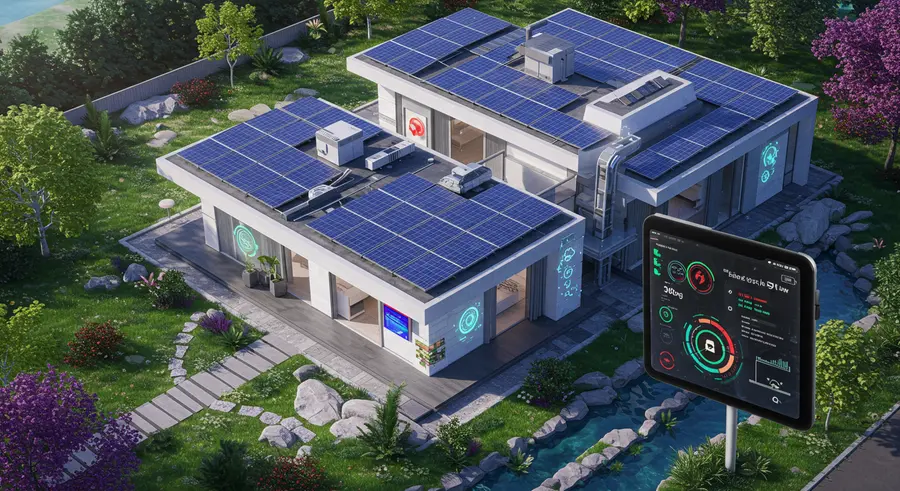Appearance
Rewiring the Future: Smart Energy Efficiency Innovations for a Sustainable Planet
In an era defined by rapid technological advancements and a growing global imperative for environmental preservation, energy efficiency has emerged as a cornerstone of sustainable development. It's not merely about conserving power; it's about intelligently managing our energy consumption to reduce waste, lower costs, and significantly diminish our carbon footprint. The year 2025 marks a pivotal moment, with groundbreaking innovations reshaping how we perceive and utilize energy. This article explores some of the most impactful advancements, showcasing how they are paving the way for a more energy-efficient and resilient world.
💡 The Rise of Intelligent Energy Management Systems
At the forefront of the energy efficiency revolution are intelligent systems powered by Artificial Intelligence (AI) and Machine Learning (ML). These sophisticated platforms are transforming buildings, industries, and even entire grids into self-optimizing ecosystems.
AI-Powered Smart Home Energy Monitors: Imagine a home that learns your habits and adjusts its energy consumption accordingly. Smart home energy monitors, often integrated with the latest Matter 1.3 standard, connect virtually every energy-using device. They track usage in real-time, allowing for predictive adjustments to HVAC systems, lighting, and appliances based on occupancy, external weather conditions, and even electricity pricing. This leads to significant energy savings by ensuring resources are utilized only when and where truly needed.
Example: Smart Thermostat Logic A simple conceptual example of how a smart thermostat, using AI/ML, might optimize heating efficiency:
python# Pseudo-code for Smart Thermostat AI Logic def optimize_heating(current_temp, desired_temp, occupancy_data, weather_forecast, energy_prices): if current_temp < desired_temp: if occupancy_data.is_occupied: if energy_prices.is_peak_hour(): # Pre-heat slightly before peak, reduce during peak return "Adjust heating based on predictive model & cost optimization" else: return "Maintain desired temperature efficiently" else: # Set to 'away' or 'eco' mode, lower temp return "Reduce heating for unoccupied space" else: return "Maintain current temperature, or turn off heating if above desired" # This logic learns over time to predict optimal heating schedules.This kind of system significantly enhances energy conservation without sacrificing comfort.
Advanced Data Analytics for Buildings: Platforms like Analytika (Analytika.com) leverage big data, IoT sensors, and AI to provide granular insights into building performance. Facility managers can pinpoint inefficiencies, predict equipment failures before they occur (predictive maintenance), and optimize HVAC systems, lighting, and ventilation. This proactive approach ensures buildings operate at peak energy performance, reducing waste and extending equipment lifespan.
⚡️ Decentralized Energy & Microgrids: Powering Resilient Communities
The shift towards decentralized energy systems and microgrids is a game-changer for energy independence and resilience. Microgrids are localized energy networks that can operate connected to the main grid or independently (island mode), powered by various sources like solar, wind, and even bioenergy.
- Enhanced Grid Reliability: For regions prone to natural disasters or grid disruptions, microgrids offer a robust solution. Paired with advanced energy storage systems and battery innovations, they ensure a stable and reliable power supply, allowing communities to generate and utilize energy more effectively. This reduces reliance on a centralized, often vulnerable, grid infrastructure.
- Maximizing Renewable Integration: As solar and wind technologies become more efficient and cost-effective, microgrids provide an ideal framework for their integration. Energy storage solutions enable the storage of surplus renewable energy generated during off-peak hours for use during peak demand or when renewable generation is low, further boosting energy efficiency.
🌿 Smart Appliances & Energy-Efficient Devices: The Everyday Impact
The smart home revolution continues to integrate energy-saving technologies into our daily lives.
- Internet-Connected Appliances: Modern refrigerators, washing machines, and ovens can be controlled remotely and programmed for optimal energy use. Many are "demand-response ready," allowing utilities to briefly throttle their usage during grid peaks in exchange for bill credits, thus contributing to overall grid stability and power optimization.
- LED Lighting: The humble light bulb has seen a massive transformation. LED lights use significantly less energy (up to 85% less than traditional CFLs) and last much longer. This widespread adoption contributes to massive energy savings at a societal level.
- Smart Plugs & Power Strips: These simple devices turn any appliance into a "smart" one, allowing for remote control and automated power cutoff. This effectively eliminates "phantom load" – the wasted energy consumed by devices when they're turned off but still plugged in.
📊 Visualizing a Smarter, Greener Future
The integration of these technologies creates a powerful synergy for energy conservation. Imagine a future where every home, every building, and every community is a node in a vast, intelligent energy network, constantly optimizing for maximum efficiency and minimal environmental impact.

Beyond the Horizon: The Ongoing Pursuit of Peak Performance
The journey towards ultimate energy efficiency is continuous. New materials for insulation, advanced building codes, and innovative financial models like "Energy Efficiency as a Service (EEaaS)" are further accelerating this transition. EEaaS, for instance, allows businesses and homeowners to implement energy-saving technologies with no upfront capital investment, making high-performance solutions accessible to a broader audience.
By embracing these energy-efficient innovations, we not only reduce our operational costs and contribute to a healthier planet but also empower individuals and communities with greater energy independence. The future is bright, and it's powered by smarter, more sustainable energy choices.
References and Further Reading:
- "Top Energy-Saving Inventions and Innovations in 2025" by Constellation: https://blog.constellation.com/2021/10/14/top-energy-saving-inventions-and-innovations/
- "The Future of Energy Efficiency Trends and Innovations" by Analytika: https://analytika.com/energy-efficiency/
- "Kickstarting the New Year: Top Energy Efficiency Trends to Watch in 2025" by Thermoelectrics: https://thermoelec.co.za/energy-efficiency-trends-2025/
- MIT News - Energy Efficiency Topic: https://news.mit.edu/topic/energy-efficiency